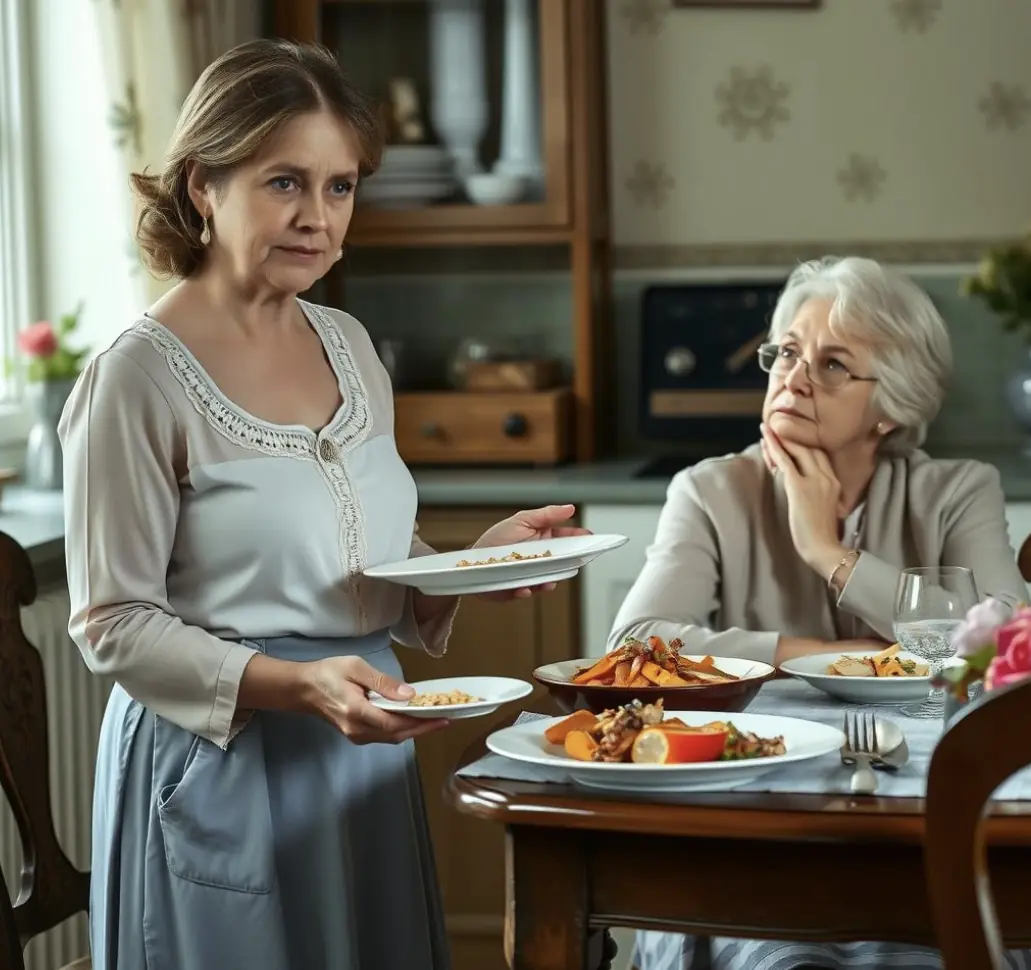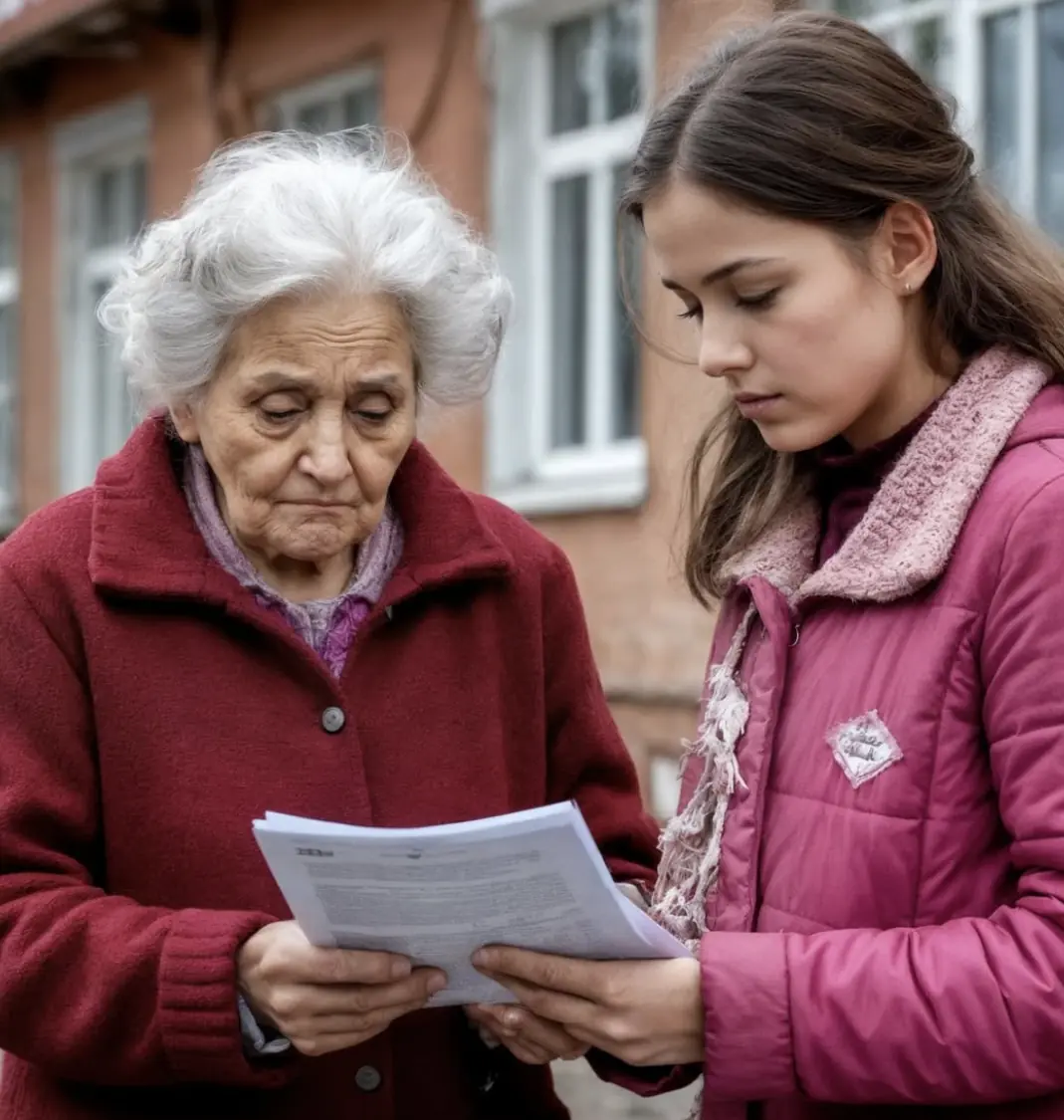
My in-law devours everything I make but refuses to pitch in

From the moment my mother-in-law stepped into our home, she made it clear that she “wasn’t a guest—just family.” I believed her. I welcomed her. I cooked for her. I listened to her stories while stirring soup and washing dishes. But slowly, that sentence—just family—began to sound less like a reassurance and more like a warning. Family, in her terms, meant I cook, she eats.
It began innocently. I made dinner the first night after her arrival: roasted chicken with herbs, mashed potatoes, and a simple salad. She ate three servings and praised me so extravagantly that my husband looked proud. I felt appreciated. But the next day, she sat at the table and asked, “What’s on the menu today, dear?” Not “Do you need help?” Not “Let me do breakfast since you cooked dinner.” No. She sat like a queen waiting for her servant. And I—embarrassingly—obeyed.
Days turned into weeks. I cooked every single meal—breakfast, lunch, and dinner. If I was late, she’d cough loudly as a reminder. She never cleaned. Never washed dishes. Never offered help. If I suggested ordering takeout, she’d sigh and say, “Nothing good comes from boxes. Only lazy people eat that.” And somehow, I ended up back at the stove—boiling, frying, chopping, serving.
It got worse when she started inviting guests. Friends from church. Old acquaintances. And every time, she would proudly say: “My daughter-in-law makes everything from scratch!” They would applaud my cooking… and leave after eating, while I scoured greasy pots alone. My husband didn’t understand why I was so exhausted. He thought I liked cooking. He thought compliments were enough repayment for hours of work. He didn’t see that I was becoming invisible—just a voice saying “dinner’s ready.”
The breaking point came one Saturday morning. I woke up early to make pancakes for the family and found the fridge empty—except for a note from her: “Please buy eggs, milk, bananas, and honey today. For lunch, make that beetroot soup I like!” I stared at the note for a full minute, stunned. She didn’t even ask. She assigned tasks—as if I was her employee.
That afternoon, I made a decision. I didn’t make lunch. I didn’t make dinner. I didn’t touch a pan. I read a book on the couch while she wandered the kitchen, confused. “Are you sick?” she asked. “No,” I said calmly. “I just don’t cook on weekends anymore. Everyone is responsible for their own meals.” She looked as though I had committed a crime. My husband shrugged. “We can order takeout, Mom.” But she refused. She opened cupboards—no food appeared magically. Eventually, she heated canned soup and glared at me as she ate it.
That night, I didn’t feel guilty. I felt free.
But freedom doesn’t arrive easily. She found ways to guilt-trip me. She sighed loudly. Told neighbors I “didn’t know how to care for elders.” Even told my husband: “She doesn’t love our family anymore. I feel like a burden.” My husband and I argued. He said: “Can’t you just help a little more? She’s old.” I said: “She has hands and legs. She just doesn’t want to use them.” He didn’t reply—but he started to see what I meant.
The turning point came unexpectedly. One Sunday morning, I woke up early—but not to cook. I went for a walk. When I returned, I found my husband bruised and irritated. Apparently, his mother had asked for eggs. He cracked them too hard. She lectured him about “proper cooking skills.” He snapped: “Then make it yourself!” Their argument escalated. She called him ungrateful. He called her entitled. And I… quietly poured myself tea and stayed out of it.
That evening, something changed. My husband walked into the kitchen and asked, “Can I help with dinner?” Those simple words were a miracle. We cooked together—for the first time since our marriage. We laughed as he burned the rice and I nearly over-salted the soup. It wasn’t perfect—but it was ours.
His mother, surprisingly, stayed silent. Maybe she realized she lost her “royal privileges.” Maybe she realized she was outnumbered now. Or maybe she saw something else happening—something more powerful than convenience.
A marriage healing.
Weeks passed. She began washing her dishes. Making her own breakfast. She even baked cookies one afternoon and left some for us on the counter—a peace offering. We didn’t return to the old routine. The kitchen became shared territory. And I began to love cooking again.
Yesterday evening, she joined us for dinner and said quietly, “Thank you—for being patient with me.” I didn’t expect that. I didn’t demand an apology. But sometimes, the absence of resistance… is enough.
I learned something important:
Love is not measured by how much you give—it is protected by how much you refuse to silently endure.
Tonight, we cooked together. All three of us. And when my mother-in-law passed me the salt, she smiled—not like a queen—but like family.
News in the same category


My wife worked hard while I was cheating but she had no idea how everything would end

Ignat threw out his wife and baby with nothing and never expected to regret it when fate brought his family back

Toddler and baby gorilla lock eyes then begin playing game no one can ignore

Dad can’t contain emotions when dog does ‘sweetest’ thing while meeting new baby sister

He let his mother rule the house, making his wife feel like a servant — but after three months, the daughter-in-law showed those rude relatives who’s really in charge

What dinner?” the wife asked. “Did you give me money for it? No? Then why should I be responsible?

A young truck driver rescues a courageous widow and discovers a life-changing love

The Unexpected Inheritance That Changed Everything

A brave young woman’s inspiring journey to a new chapter of self-love and health

The quiet den: a father left behind

I stopped to assist an elderly man at a restaurant, and it changed my perspective on my father

My Sister’s Perfect Life Was A Lie—Until I Uncovered Her Hidden Baby

I Walked In On My Husband’s Secret—And He Told Me I Was Next

Top 10 “Most Beautiful Women in the World” According to the New “Golden Ratio” Calculation

91 YEAR-OLD WOMAN ARRESTED FOR TRYING TO STEAL MEDICATION

Sea otter mon wrap their pops in a kelp blenket to stop them loating away while she dives for food

Identical twin sisters give birth to sons on same day at the same hospital
News Post

Trying to snag my other son now?” my mother-in-law yelled when she saw my shoes

My daughter sent me to a nursing home—not knowing it was actually mine. That’s when I decided to teach her a lesson

I’ve filed for divorce — and the property division too. Just so you know, half of your apartment belongs to me now

My wife worked hard while I was cheating but she had no idea how everything would end

Ignat threw out his wife and baby with nothing and never expected to regret it when fate brought his family back

Toddler and baby gorilla lock eyes then begin playing game no one can ignore

Dad can’t contain emotions when dog does ‘sweetest’ thing while meeting new baby sister

He let his mother rule the house, making his wife feel like a servant — but after three months, the daughter-in-law showed those rude relatives who’s really in charge

What dinner?” the wife asked. “Did you give me money for it? No? Then why should I be responsible?

A young truck driver rescues a courageous widow and discovers a life-changing love

The Unexpected Inheritance That Changed Everything

A brave young woman’s inspiring journey to a new chapter of self-love and health

The quiet den: a father left behind

I stopped to assist an elderly man at a restaurant, and it changed my perspective on my father

5-Minute Pistachio Smoothie Bowl – A Creamy Dreamy Breakfast

Stretch your ring finger with your thumb and hold it for a few seconds. you'll love the reason!

Woman issues terrifying warning after finding a stroller abandoned on the side of the road

4 “Can.cer-Causing Culprits” Hiding Quietly in Your Home
